MOD005908 - Ethics & Values in Health and Social Care - Nursing Home
VerifiedAdded on 2023/06/14
|12
|2622
|387
Report
AI Summary
This report outlines the core ethical principles and values essential for care in nursing homes, emphasizing Freda Principles, principles of life, caring ethics, normative ethics, empirical ethics, interaction ethics, and integrity ethics. It discusses factors influencing personal ethics and values, such as religious beliefs, culture, social values, upbringing values, economic values, professional values, human values, cultural values and moral self-respect values. The report also identifies appropriate ways to resolve ethical situations while maintaining professional boundaries, including transparency, confidentiality, cultural sensitivity training, clear job descriptions, and codes of conduct. The report concludes by stressing the importance of hygiene and cleanliness in nursing homes to prevent the spread of germs and protect the health of elderly residents.
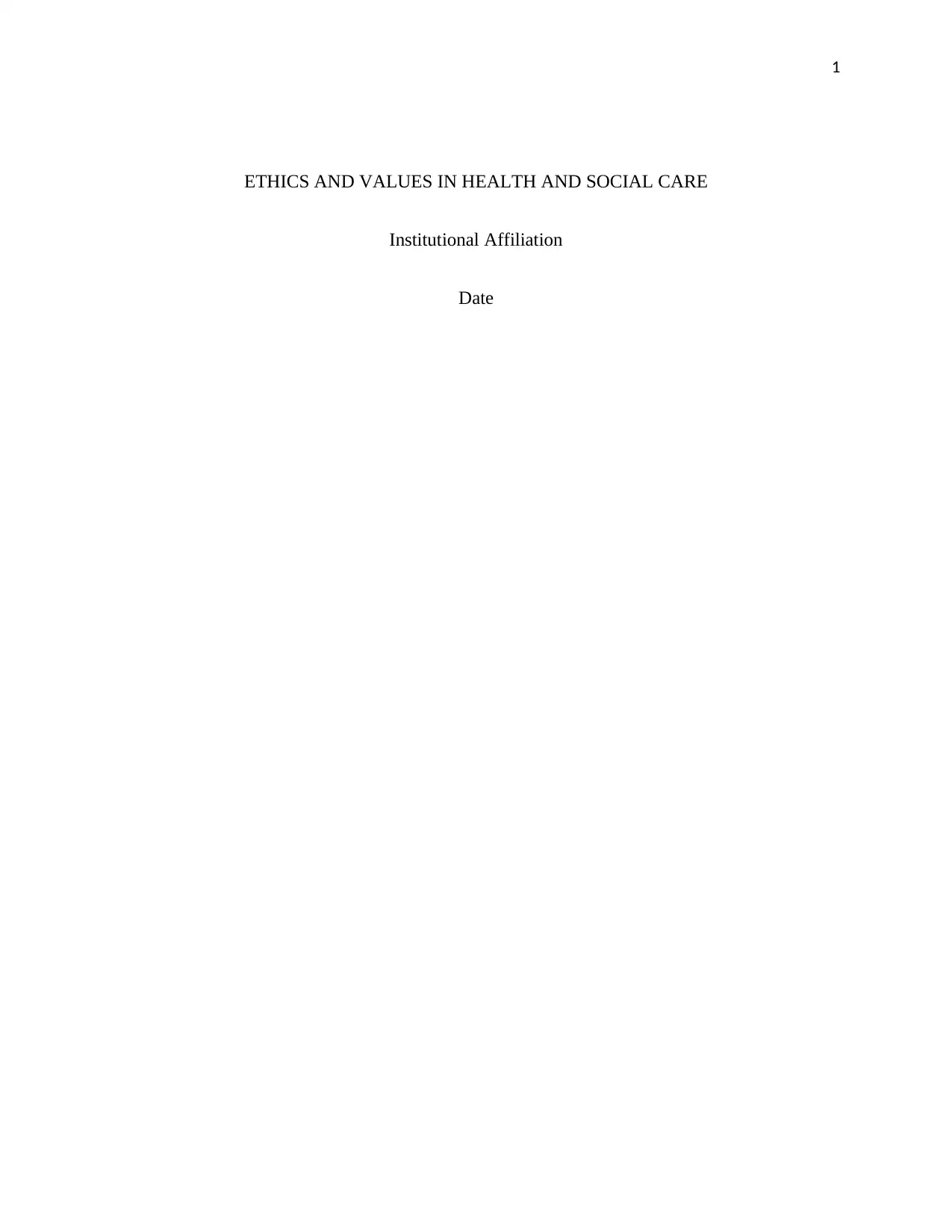
1
ETHICS AND VALUES IN HEALTH AND SOCIAL CARE
Institutional Affiliation
Date
ETHICS AND VALUES IN HEALTH AND SOCIAL CARE
Institutional Affiliation
Date
Paraphrase This Document
Need a fresh take? Get an instant paraphrase of this document with our AI Paraphraser
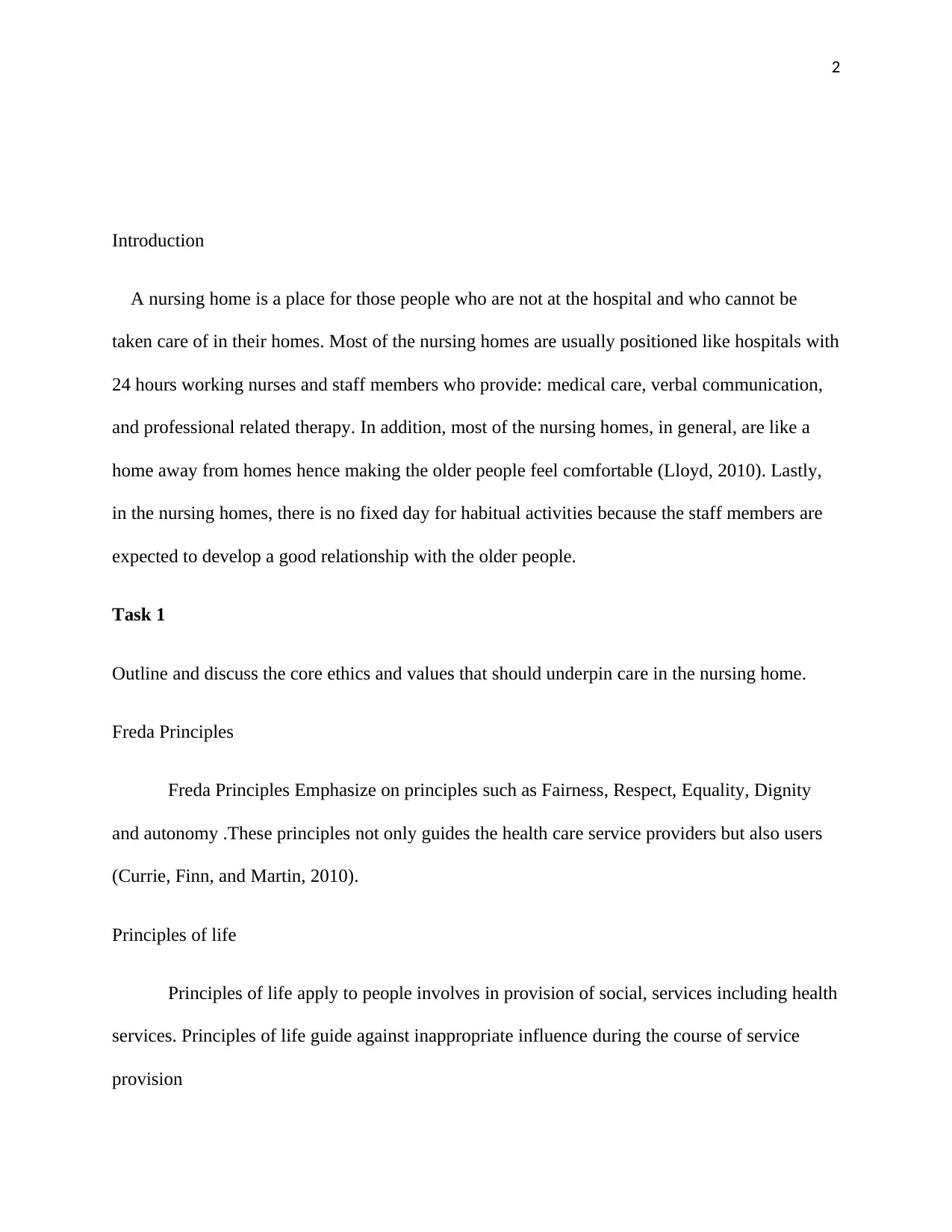
2
Introduction
A nursing home is a place for those people who are not at the hospital and who cannot be
taken care of in their homes. Most of the nursing homes are usually positioned like hospitals with
24 hours working nurses and staff members who provide: medical care, verbal communication,
and professional related therapy. In addition, most of the nursing homes, in general, are like a
home away from homes hence making the older people feel comfortable (Lloyd, 2010). Lastly,
in the nursing homes, there is no fixed day for habitual activities because the staff members are
expected to develop a good relationship with the older people.
Task 1
Outline and discuss the core ethics and values that should underpin care in the nursing home.
Freda Principles
Freda Principles Emphasize on principles such as Fairness, Respect, Equality, Dignity
and autonomy .These principles not only guides the health care service providers but also users
(Currie, Finn, and Martin, 2010).
Principles of life
Principles of life apply to people involves in provision of social, services including health
services. Principles of life guide against inappropriate influence during the course of service
provision
Introduction
A nursing home is a place for those people who are not at the hospital and who cannot be
taken care of in their homes. Most of the nursing homes are usually positioned like hospitals with
24 hours working nurses and staff members who provide: medical care, verbal communication,
and professional related therapy. In addition, most of the nursing homes, in general, are like a
home away from homes hence making the older people feel comfortable (Lloyd, 2010). Lastly,
in the nursing homes, there is no fixed day for habitual activities because the staff members are
expected to develop a good relationship with the older people.
Task 1
Outline and discuss the core ethics and values that should underpin care in the nursing home.
Freda Principles
Freda Principles Emphasize on principles such as Fairness, Respect, Equality, Dignity
and autonomy .These principles not only guides the health care service providers but also users
(Currie, Finn, and Martin, 2010).
Principles of life
Principles of life apply to people involves in provision of social, services including health
services. Principles of life guide against inappropriate influence during the course of service
provision
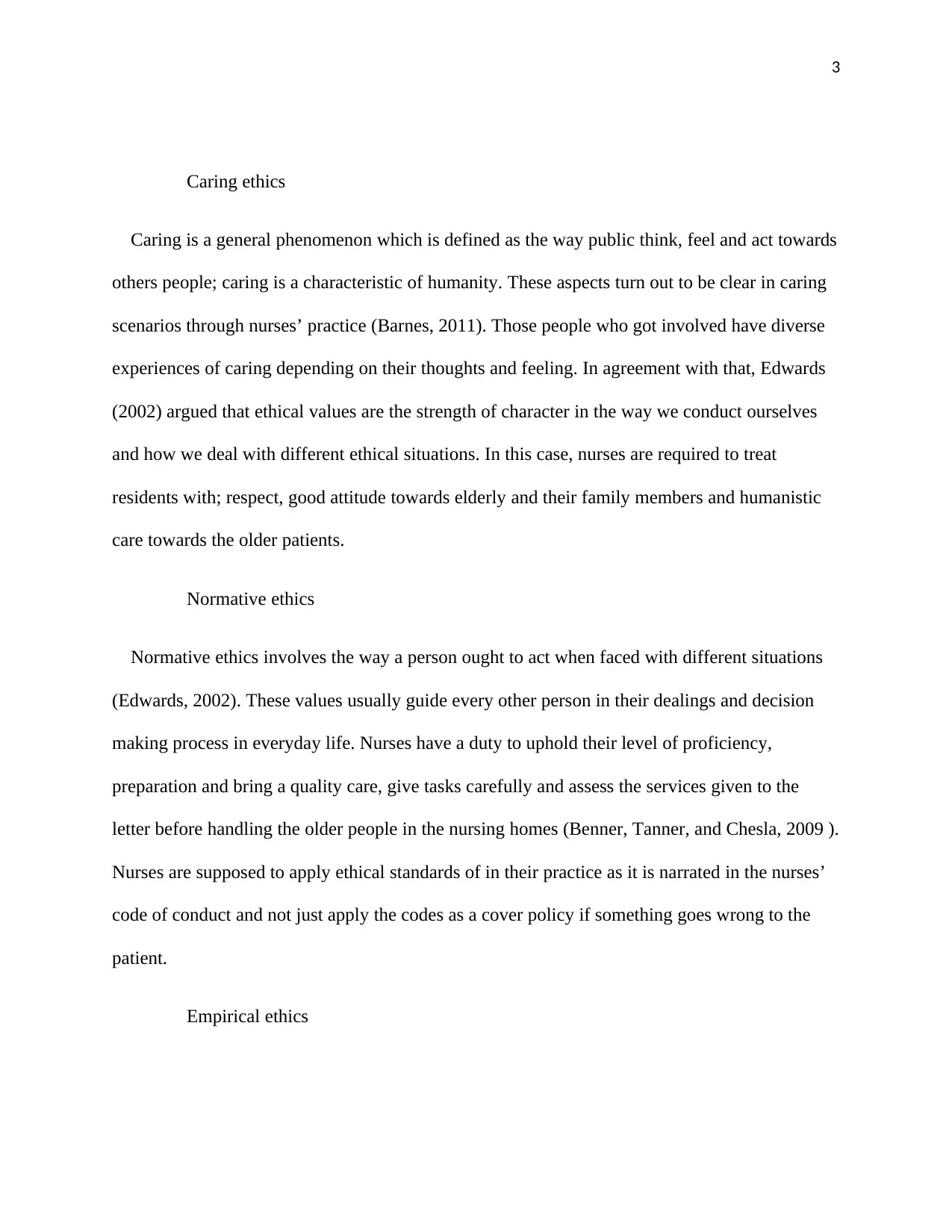
3
Caring ethics
Caring is a general phenomenon which is defined as the way public think, feel and act towards
others people; caring is a characteristic of humanity. These aspects turn out to be clear in caring
scenarios through nurses’ practice (Barnes, 2011). Those people who got involved have diverse
experiences of caring depending on their thoughts and feeling. In agreement with that, Edwards
(2002) argued that ethical values are the strength of character in the way we conduct ourselves
and how we deal with different ethical situations. In this case, nurses are required to treat
residents with; respect, good attitude towards elderly and their family members and humanistic
care towards the older patients.
Normative ethics
Normative ethics involves the way a person ought to act when faced with different situations
(Edwards, 2002). These values usually guide every other person in their dealings and decision
making process in everyday life. Nurses have a duty to uphold their level of proficiency,
preparation and bring a quality care, give tasks carefully and assess the services given to the
letter before handling the older people in the nursing homes (Benner, Tanner, and Chesla, 2009 ).
Nurses are supposed to apply ethical standards of in their practice as it is narrated in the nurses’
code of conduct and not just apply the codes as a cover policy if something goes wrong to the
patient.
Empirical ethics
Caring ethics
Caring is a general phenomenon which is defined as the way public think, feel and act towards
others people; caring is a characteristic of humanity. These aspects turn out to be clear in caring
scenarios through nurses’ practice (Barnes, 2011). Those people who got involved have diverse
experiences of caring depending on their thoughts and feeling. In agreement with that, Edwards
(2002) argued that ethical values are the strength of character in the way we conduct ourselves
and how we deal with different ethical situations. In this case, nurses are required to treat
residents with; respect, good attitude towards elderly and their family members and humanistic
care towards the older patients.
Normative ethics
Normative ethics involves the way a person ought to act when faced with different situations
(Edwards, 2002). These values usually guide every other person in their dealings and decision
making process in everyday life. Nurses have a duty to uphold their level of proficiency,
preparation and bring a quality care, give tasks carefully and assess the services given to the
letter before handling the older people in the nursing homes (Benner, Tanner, and Chesla, 2009 ).
Nurses are supposed to apply ethical standards of in their practice as it is narrated in the nurses’
code of conduct and not just apply the codes as a cover policy if something goes wrong to the
patient.
Empirical ethics
⊘ This is a preview!⊘
Do you want full access?
Subscribe today to unlock all pages.

Trusted by 1+ million students worldwide
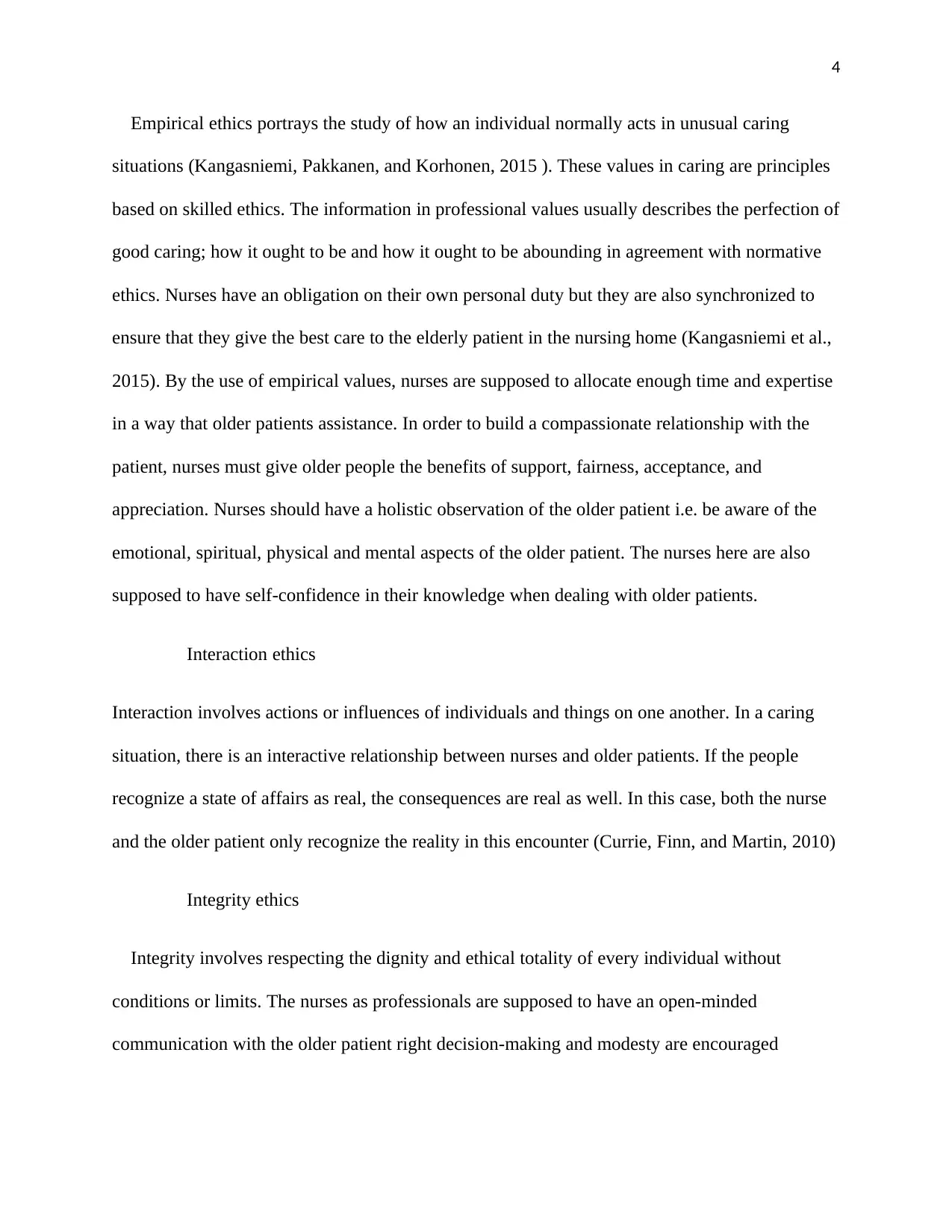
4
Empirical ethics portrays the study of how an individual normally acts in unusual caring
situations (Kangasniemi, Pakkanen, and Korhonen, 2015 ). These values in caring are principles
based on skilled ethics. The information in professional values usually describes the perfection of
good caring; how it ought to be and how it ought to be abounding in agreement with normative
ethics. Nurses have an obligation on their own personal duty but they are also synchronized to
ensure that they give the best care to the elderly patient in the nursing home (Kangasniemi et al.,
2015). By the use of empirical values, nurses are supposed to allocate enough time and expertise
in a way that older patients assistance. In order to build a compassionate relationship with the
patient, nurses must give older people the benefits of support, fairness, acceptance, and
appreciation. Nurses should have a holistic observation of the older patient i.e. be aware of the
emotional, spiritual, physical and mental aspects of the older patient. The nurses here are also
supposed to have self-confidence in their knowledge when dealing with older patients.
Interaction ethics
Interaction involves actions or influences of individuals and things on one another. In a caring
situation, there is an interactive relationship between nurses and older patients. If the people
recognize a state of affairs as real, the consequences are real as well. In this case, both the nurse
and the older patient only recognize the reality in this encounter (Currie, Finn, and Martin, 2010)
Integrity ethics
Integrity involves respecting the dignity and ethical totality of every individual without
conditions or limits. The nurses as professionals are supposed to have an open-minded
communication with the older patient right decision-making and modesty are encouraged
Empirical ethics portrays the study of how an individual normally acts in unusual caring
situations (Kangasniemi, Pakkanen, and Korhonen, 2015 ). These values in caring are principles
based on skilled ethics. The information in professional values usually describes the perfection of
good caring; how it ought to be and how it ought to be abounding in agreement with normative
ethics. Nurses have an obligation on their own personal duty but they are also synchronized to
ensure that they give the best care to the elderly patient in the nursing home (Kangasniemi et al.,
2015). By the use of empirical values, nurses are supposed to allocate enough time and expertise
in a way that older patients assistance. In order to build a compassionate relationship with the
patient, nurses must give older people the benefits of support, fairness, acceptance, and
appreciation. Nurses should have a holistic observation of the older patient i.e. be aware of the
emotional, spiritual, physical and mental aspects of the older patient. The nurses here are also
supposed to have self-confidence in their knowledge when dealing with older patients.
Interaction ethics
Interaction involves actions or influences of individuals and things on one another. In a caring
situation, there is an interactive relationship between nurses and older patients. If the people
recognize a state of affairs as real, the consequences are real as well. In this case, both the nurse
and the older patient only recognize the reality in this encounter (Currie, Finn, and Martin, 2010)
Integrity ethics
Integrity involves respecting the dignity and ethical totality of every individual without
conditions or limits. The nurses as professionals are supposed to have an open-minded
communication with the older patient right decision-making and modesty are encouraged
Paraphrase This Document
Need a fresh take? Get an instant paraphrase of this document with our AI Paraphraser
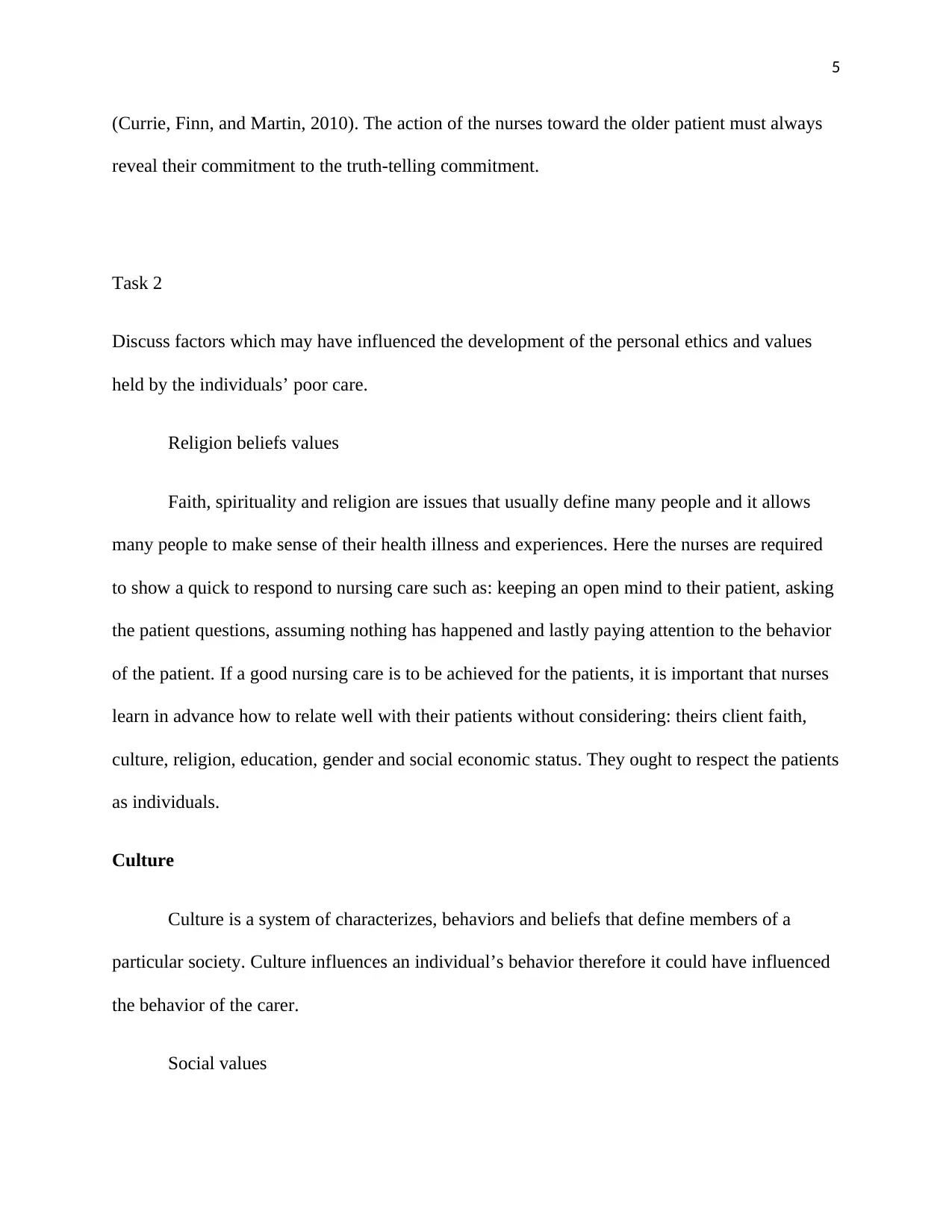
5
(Currie, Finn, and Martin, 2010). The action of the nurses toward the older patient must always
reveal their commitment to the truth-telling commitment.
Task 2
Discuss factors which may have influenced the development of the personal ethics and values
held by the individuals’ poor care.
Religion beliefs values
Faith, spirituality and religion are issues that usually define many people and it allows
many people to make sense of their health illness and experiences. Here the nurses are required
to show a quick to respond to nursing care such as: keeping an open mind to their patient, asking
the patient questions, assuming nothing has happened and lastly paying attention to the behavior
of the patient. If a good nursing care is to be achieved for the patients, it is important that nurses
learn in advance how to relate well with their patients without considering: theirs client faith,
culture, religion, education, gender and social economic status. They ought to respect the patients
as individuals.
Culture
Culture is a system of characterizes, behaviors and beliefs that define members of a
particular society. Culture influences an individual’s behavior therefore it could have influenced
the behavior of the carer.
Social values
(Currie, Finn, and Martin, 2010). The action of the nurses toward the older patient must always
reveal their commitment to the truth-telling commitment.
Task 2
Discuss factors which may have influenced the development of the personal ethics and values
held by the individuals’ poor care.
Religion beliefs values
Faith, spirituality and religion are issues that usually define many people and it allows
many people to make sense of their health illness and experiences. Here the nurses are required
to show a quick to respond to nursing care such as: keeping an open mind to their patient, asking
the patient questions, assuming nothing has happened and lastly paying attention to the behavior
of the patient. If a good nursing care is to be achieved for the patients, it is important that nurses
learn in advance how to relate well with their patients without considering: theirs client faith,
culture, religion, education, gender and social economic status. They ought to respect the patients
as individuals.
Culture
Culture is a system of characterizes, behaviors and beliefs that define members of a
particular society. Culture influences an individual’s behavior therefore it could have influenced
the behavior of the carer.
Social values
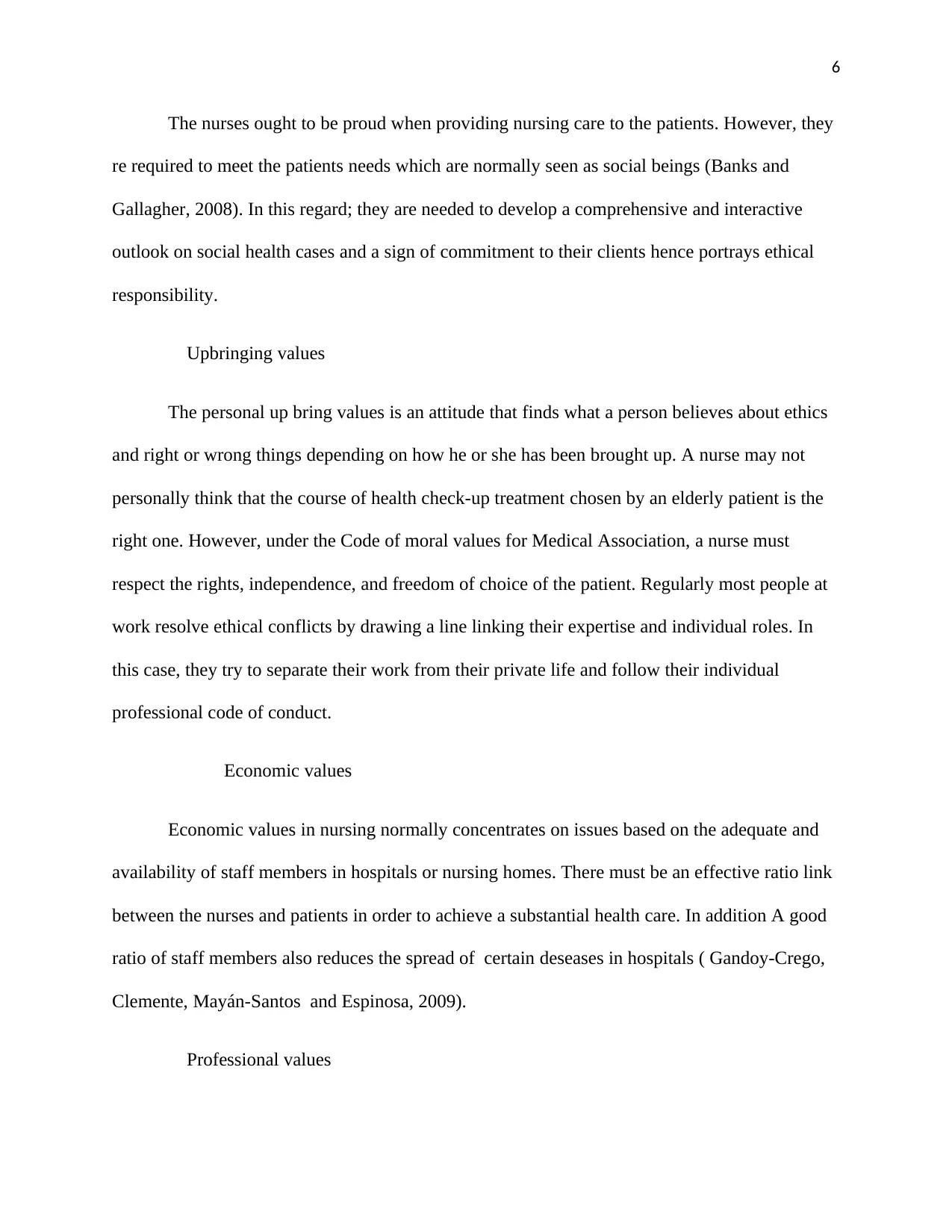
6
The nurses ought to be proud when providing nursing care to the patients. However, they
re required to meet the patients needs which are normally seen as social beings (Banks and
Gallagher, 2008). In this regard; they are needed to develop a comprehensive and interactive
outlook on social health cases and a sign of commitment to their clients hence portrays ethical
responsibility.
Upbringing values
The personal up bring values is an attitude that finds what a person believes about ethics
and right or wrong things depending on how he or she has been brought up. A nurse may not
personally think that the course of health check-up treatment chosen by an elderly patient is the
right one. However, under the Code of moral values for Medical Association, a nurse must
respect the rights, independence, and freedom of choice of the patient. Regularly most people at
work resolve ethical conflicts by drawing a line linking their expertise and individual roles. In
this case, they try to separate their work from their private life and follow their individual
professional code of conduct.
Economic values
Economic values in nursing normally concentrates on issues based on the adequate and
availability of staff members in hospitals or nursing homes. There must be an effective ratio link
between the nurses and patients in order to achieve a substantial health care. In addition A good
ratio of staff members also reduces the spread of certain deseases in hospitals ( Gandoy-Crego,
Clemente, Mayán-Santos and Espinosa, 2009).
Professional values
The nurses ought to be proud when providing nursing care to the patients. However, they
re required to meet the patients needs which are normally seen as social beings (Banks and
Gallagher, 2008). In this regard; they are needed to develop a comprehensive and interactive
outlook on social health cases and a sign of commitment to their clients hence portrays ethical
responsibility.
Upbringing values
The personal up bring values is an attitude that finds what a person believes about ethics
and right or wrong things depending on how he or she has been brought up. A nurse may not
personally think that the course of health check-up treatment chosen by an elderly patient is the
right one. However, under the Code of moral values for Medical Association, a nurse must
respect the rights, independence, and freedom of choice of the patient. Regularly most people at
work resolve ethical conflicts by drawing a line linking their expertise and individual roles. In
this case, they try to separate their work from their private life and follow their individual
professional code of conduct.
Economic values
Economic values in nursing normally concentrates on issues based on the adequate and
availability of staff members in hospitals or nursing homes. There must be an effective ratio link
between the nurses and patients in order to achieve a substantial health care. In addition A good
ratio of staff members also reduces the spread of certain deseases in hospitals ( Gandoy-Crego,
Clemente, Mayán-Santos and Espinosa, 2009).
Professional values
⊘ This is a preview!⊘
Do you want full access?
Subscribe today to unlock all pages.

Trusted by 1+ million students worldwide
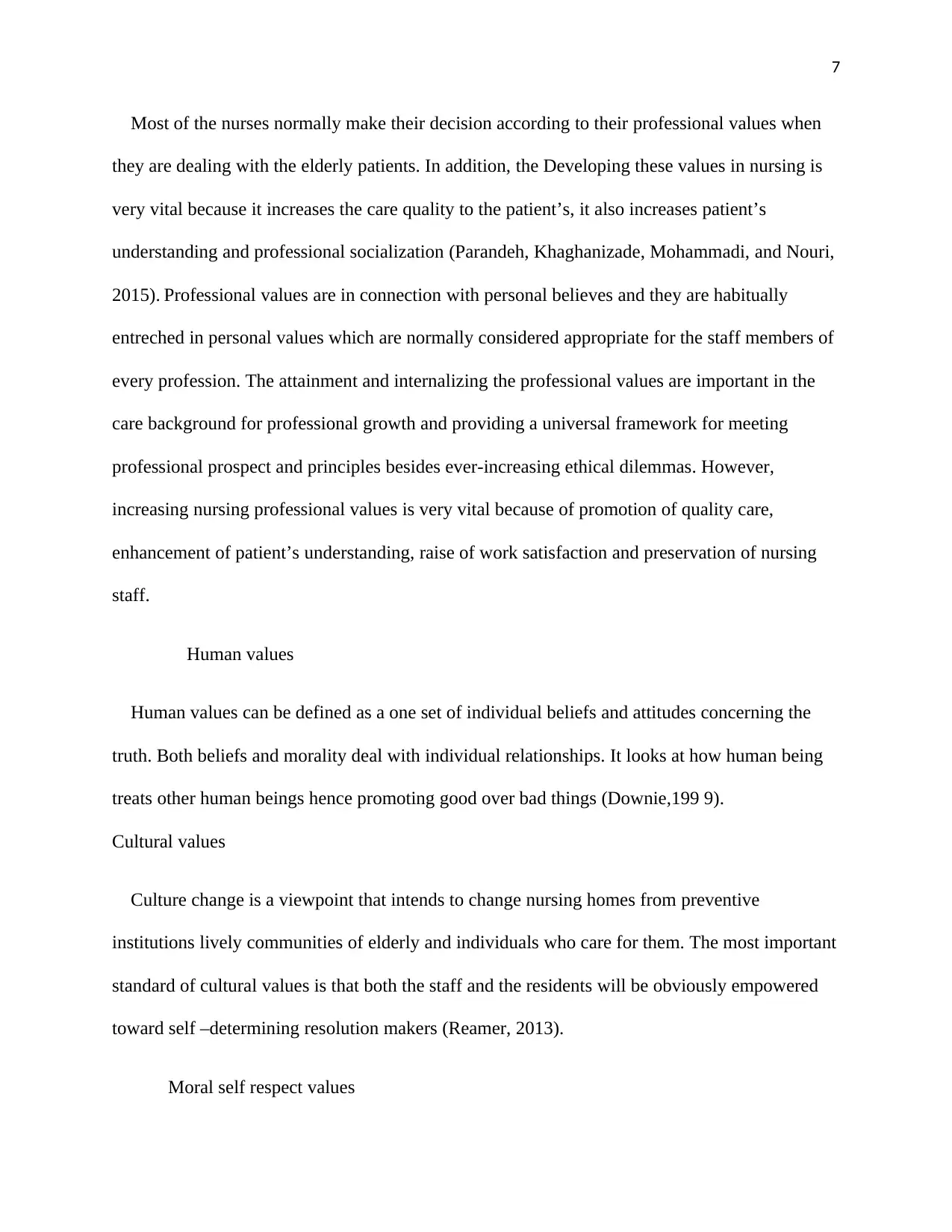
7
Most of the nurses normally make their decision according to their professional values when
they are dealing with the elderly patients. In addition, the Developing these values in nursing is
very vital because it increases the care quality to the patient’s, it also increases patient’s
understanding and professional socialization (Parandeh, Khaghanizade, Mohammadi, and Nouri,
2015). Professional values are in connection with personal believes and they are habitually
entreched in personal values which are normally considered appropriate for the staff members of
every profession. The attainment and internalizing the professional values are important in the
care background for professional growth and providing a universal framework for meeting
professional prospect and principles besides ever-increasing ethical dilemmas. However,
increasing nursing professional values is very vital because of promotion of quality care,
enhancement of patient’s understanding, raise of work satisfaction and preservation of nursing
staff.
Human values
Human values can be defined as a one set of individual beliefs and attitudes concerning the
truth. Both beliefs and morality deal with individual relationships. It looks at how human being
treats other human beings hence promoting good over bad things (Downie,199 9).
Cultural values
Culture change is a viewpoint that intends to change nursing homes from preventive
institutions lively communities of elderly and individuals who care for them. The most important
standard of cultural values is that both the staff and the residents will be obviously empowered
toward self –determining resolution makers (Reamer, 2013).
Moral self respect values
Most of the nurses normally make their decision according to their professional values when
they are dealing with the elderly patients. In addition, the Developing these values in nursing is
very vital because it increases the care quality to the patient’s, it also increases patient’s
understanding and professional socialization (Parandeh, Khaghanizade, Mohammadi, and Nouri,
2015). Professional values are in connection with personal believes and they are habitually
entreched in personal values which are normally considered appropriate for the staff members of
every profession. The attainment and internalizing the professional values are important in the
care background for professional growth and providing a universal framework for meeting
professional prospect and principles besides ever-increasing ethical dilemmas. However,
increasing nursing professional values is very vital because of promotion of quality care,
enhancement of patient’s understanding, raise of work satisfaction and preservation of nursing
staff.
Human values
Human values can be defined as a one set of individual beliefs and attitudes concerning the
truth. Both beliefs and morality deal with individual relationships. It looks at how human being
treats other human beings hence promoting good over bad things (Downie,199 9).
Cultural values
Culture change is a viewpoint that intends to change nursing homes from preventive
institutions lively communities of elderly and individuals who care for them. The most important
standard of cultural values is that both the staff and the residents will be obviously empowered
toward self –determining resolution makers (Reamer, 2013).
Moral self respect values
Paraphrase This Document
Need a fresh take? Get an instant paraphrase of this document with our AI Paraphraser
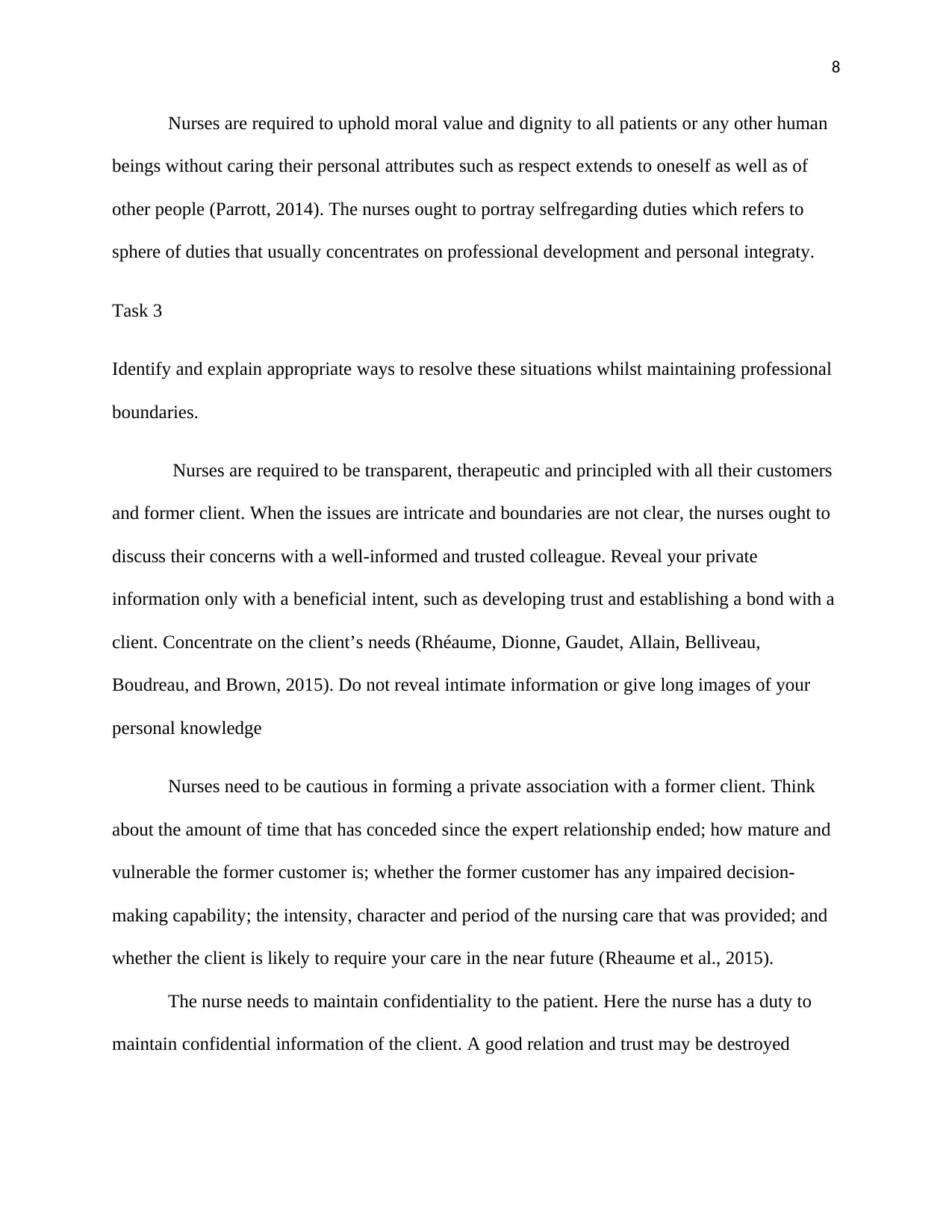
8
Nurses are required to uphold moral value and dignity to all patients or any other human
beings without caring their personal attributes such as respect extends to oneself as well as of
other people (Parrott, 2014). The nurses ought to portray selfregarding duties which refers to
sphere of duties that usually concentrates on professional development and personal integraty.
Task 3
Identify and explain appropriate ways to resolve these situations whilst maintaining professional
boundaries.
Nurses are required to be transparent, therapeutic and principled with all their customers
and former client. When the issues are intricate and boundaries are not clear, the nurses ought to
discuss their concerns with a well-informed and trusted colleague. Reveal your private
information only with a beneficial intent, such as developing trust and establishing a bond with a
client. Concentrate on the client’s needs (Rhéaume, Dionne, Gaudet, Allain, Belliveau,
Boudreau, and Brown, 2015). Do not reveal intimate information or give long images of your
personal knowledge
Nurses need to be cautious in forming a private association with a former client. Think
about the amount of time that has conceded since the expert relationship ended; how mature and
vulnerable the former customer is; whether the former customer has any impaired decision-
making capability; the intensity, character and period of the nursing care that was provided; and
whether the client is likely to require your care in the near future (Rheaume et al., 2015).
The nurse needs to maintain confidentiality to the patient. Here the nurse has a duty to
maintain confidential information of the client. A good relation and trust may be destroyed
Nurses are required to uphold moral value and dignity to all patients or any other human
beings without caring their personal attributes such as respect extends to oneself as well as of
other people (Parrott, 2014). The nurses ought to portray selfregarding duties which refers to
sphere of duties that usually concentrates on professional development and personal integraty.
Task 3
Identify and explain appropriate ways to resolve these situations whilst maintaining professional
boundaries.
Nurses are required to be transparent, therapeutic and principled with all their customers
and former client. When the issues are intricate and boundaries are not clear, the nurses ought to
discuss their concerns with a well-informed and trusted colleague. Reveal your private
information only with a beneficial intent, such as developing trust and establishing a bond with a
client. Concentrate on the client’s needs (Rhéaume, Dionne, Gaudet, Allain, Belliveau,
Boudreau, and Brown, 2015). Do not reveal intimate information or give long images of your
personal knowledge
Nurses need to be cautious in forming a private association with a former client. Think
about the amount of time that has conceded since the expert relationship ended; how mature and
vulnerable the former customer is; whether the former customer has any impaired decision-
making capability; the intensity, character and period of the nursing care that was provided; and
whether the client is likely to require your care in the near future (Rheaume et al., 2015).
The nurse needs to maintain confidentiality to the patient. Here the nurse has a duty to
maintain confidential information of the client. A good relation and trust may be destroyed
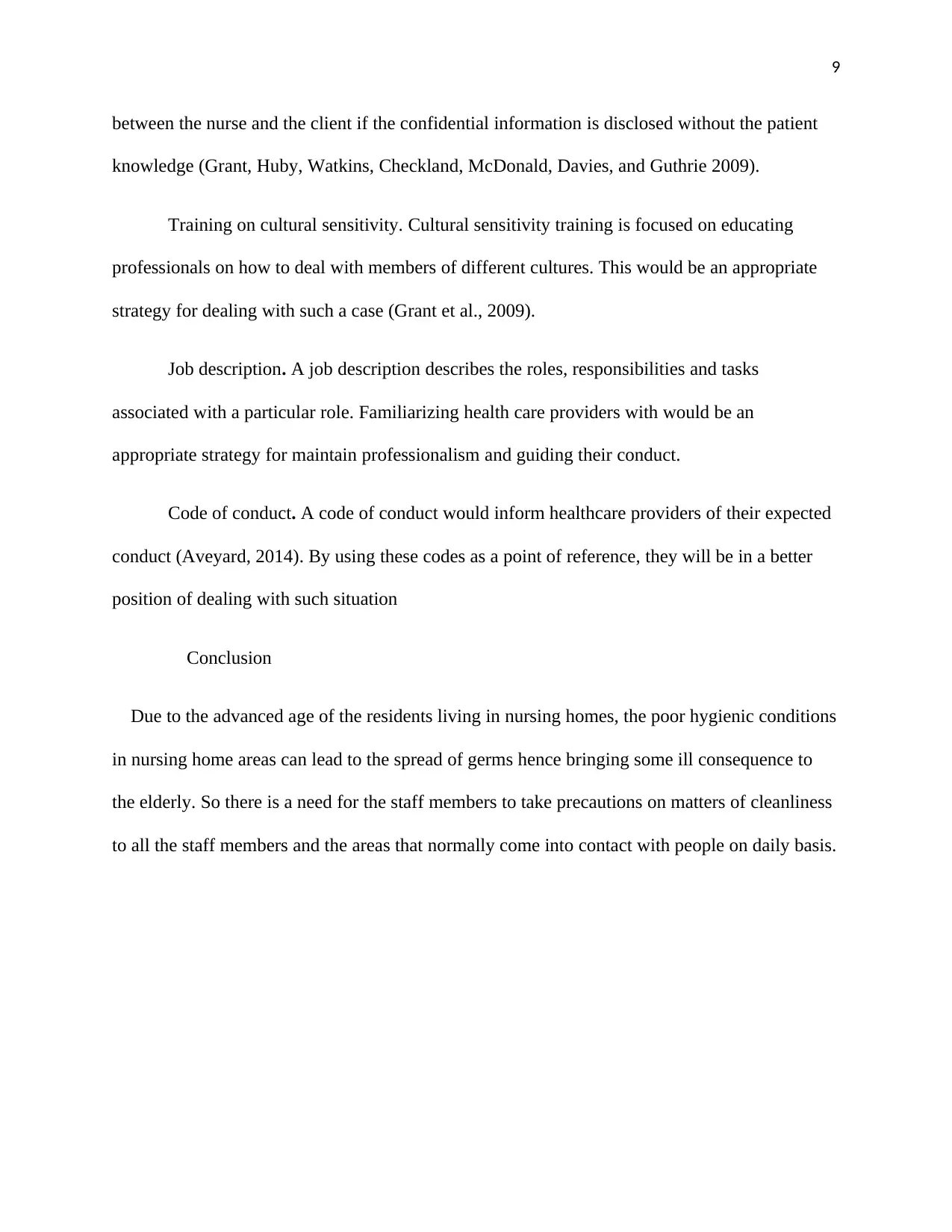
9
between the nurse and the client if the confidential information is disclosed without the patient
knowledge (Grant, Huby, Watkins, Checkland, McDonald, Davies, and Guthrie 2009).
Training on cultural sensitivity. Cultural sensitivity training is focused on educating
professionals on how to deal with members of different cultures. This would be an appropriate
strategy for dealing with such a case (Grant et al., 2009).
Job description. A job description describes the roles, responsibilities and tasks
associated with a particular role. Familiarizing health care providers with would be an
appropriate strategy for maintain professionalism and guiding their conduct.
Code of conduct. A code of conduct would inform healthcare providers of their expected
conduct (Aveyard, 2014). By using these codes as a point of reference, they will be in a better
position of dealing with such situation
Conclusion
Due to the advanced age of the residents living in nursing homes, the poor hygienic conditions
in nursing home areas can lead to the spread of germs hence bringing some ill consequence to
the elderly. So there is a need for the staff members to take precautions on matters of cleanliness
to all the staff members and the areas that normally come into contact with people on daily basis.
between the nurse and the client if the confidential information is disclosed without the patient
knowledge (Grant, Huby, Watkins, Checkland, McDonald, Davies, and Guthrie 2009).
Training on cultural sensitivity. Cultural sensitivity training is focused on educating
professionals on how to deal with members of different cultures. This would be an appropriate
strategy for dealing with such a case (Grant et al., 2009).
Job description. A job description describes the roles, responsibilities and tasks
associated with a particular role. Familiarizing health care providers with would be an
appropriate strategy for maintain professionalism and guiding their conduct.
Code of conduct. A code of conduct would inform healthcare providers of their expected
conduct (Aveyard, 2014). By using these codes as a point of reference, they will be in a better
position of dealing with such situation
Conclusion
Due to the advanced age of the residents living in nursing homes, the poor hygienic conditions
in nursing home areas can lead to the spread of germs hence bringing some ill consequence to
the elderly. So there is a need for the staff members to take precautions on matters of cleanliness
to all the staff members and the areas that normally come into contact with people on daily basis.
⊘ This is a preview!⊘
Do you want full access?
Subscribe today to unlock all pages.

Trusted by 1+ million students worldwide
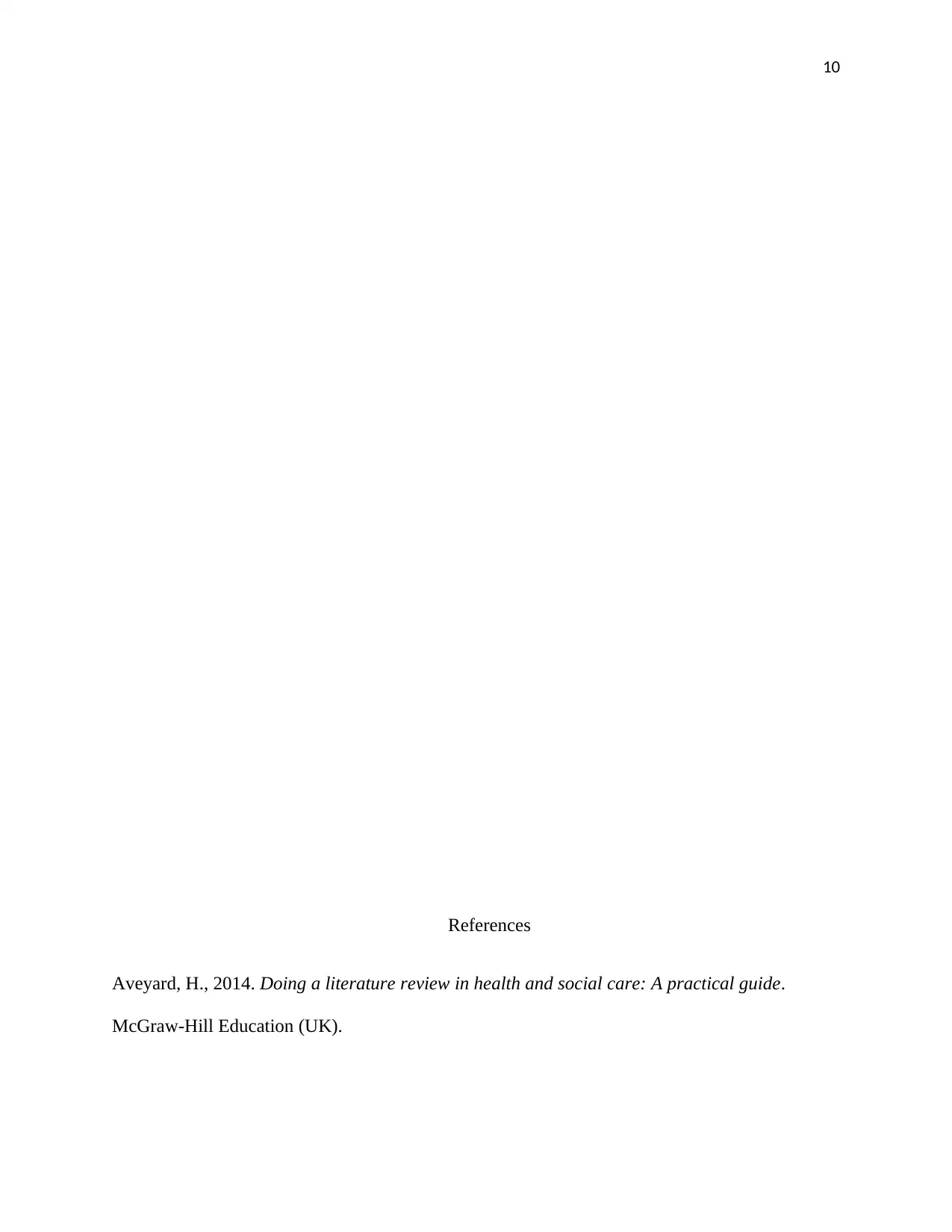
10
References
Aveyard, H., 2014. Doing a literature review in health and social care: A practical guide.
McGraw-Hill Education (UK).
References
Aveyard, H., 2014. Doing a literature review in health and social care: A practical guide.
McGraw-Hill Education (UK).
Paraphrase This Document
Need a fresh take? Get an instant paraphrase of this document with our AI Paraphraser
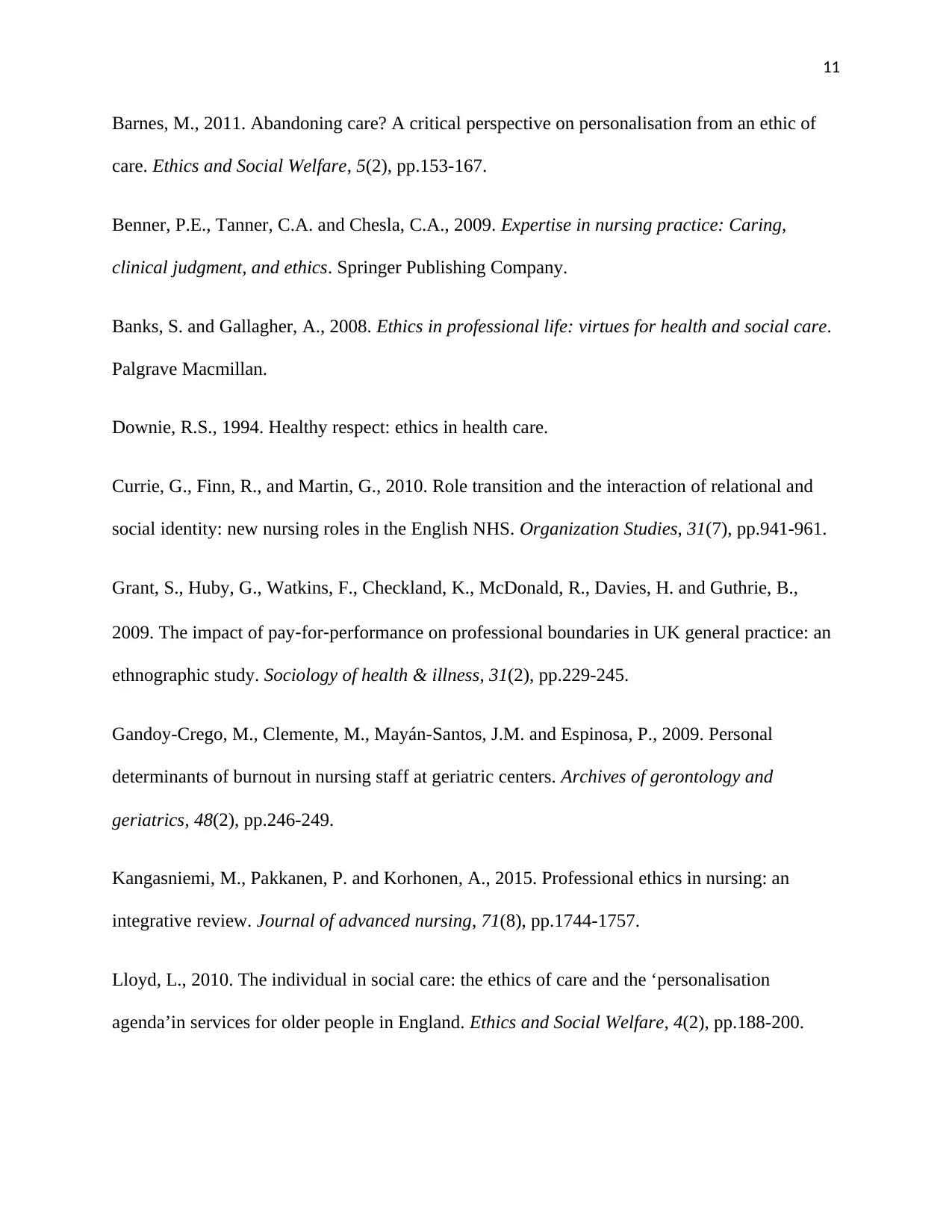
11
Barnes, M., 2011. Abandoning care? A critical perspective on personalisation from an ethic of
care. Ethics and Social Welfare, 5(2), pp.153-167.
Benner, P.E., Tanner, C.A. and Chesla, C.A., 2009. Expertise in nursing practice: Caring,
clinical judgment, and ethics. Springer Publishing Company.
Banks, S. and Gallagher, A., 2008. Ethics in professional life: virtues for health and social care.
Palgrave Macmillan.
Downie, R.S., 1994. Healthy respect: ethics in health care.
Currie, G., Finn, R., and Martin, G., 2010. Role transition and the interaction of relational and
social identity: new nursing roles in the English NHS. Organization Studies, 31(7), pp.941-961.
Grant, S., Huby, G., Watkins, F., Checkland, K., McDonald, R., Davies, H. and Guthrie, B.,
2009. The impact of pay‐for‐performance on professional boundaries in UK general practice: an
ethnographic study. Sociology of health & illness, 31(2), pp.229-245.
Gandoy-Crego, M., Clemente, M., Mayán-Santos, J.M. and Espinosa, P., 2009. Personal
determinants of burnout in nursing staff at geriatric centers. Archives of gerontology and
geriatrics, 48(2), pp.246-249.
Kangasniemi, M., Pakkanen, P. and Korhonen, A., 2015. Professional ethics in nursing: an
integrative review. Journal of advanced nursing, 71(8), pp.1744-1757.
Lloyd, L., 2010. The individual in social care: the ethics of care and the ‘personalisation
agenda’in services for older people in England. Ethics and Social Welfare, 4(2), pp.188-200.
Barnes, M., 2011. Abandoning care? A critical perspective on personalisation from an ethic of
care. Ethics and Social Welfare, 5(2), pp.153-167.
Benner, P.E., Tanner, C.A. and Chesla, C.A., 2009. Expertise in nursing practice: Caring,
clinical judgment, and ethics. Springer Publishing Company.
Banks, S. and Gallagher, A., 2008. Ethics in professional life: virtues for health and social care.
Palgrave Macmillan.
Downie, R.S., 1994. Healthy respect: ethics in health care.
Currie, G., Finn, R., and Martin, G., 2010. Role transition and the interaction of relational and
social identity: new nursing roles in the English NHS. Organization Studies, 31(7), pp.941-961.
Grant, S., Huby, G., Watkins, F., Checkland, K., McDonald, R., Davies, H. and Guthrie, B.,
2009. The impact of pay‐for‐performance on professional boundaries in UK general practice: an
ethnographic study. Sociology of health & illness, 31(2), pp.229-245.
Gandoy-Crego, M., Clemente, M., Mayán-Santos, J.M. and Espinosa, P., 2009. Personal
determinants of burnout in nursing staff at geriatric centers. Archives of gerontology and
geriatrics, 48(2), pp.246-249.
Kangasniemi, M., Pakkanen, P. and Korhonen, A., 2015. Professional ethics in nursing: an
integrative review. Journal of advanced nursing, 71(8), pp.1744-1757.
Lloyd, L., 2010. The individual in social care: the ethics of care and the ‘personalisation
agenda’in services for older people in England. Ethics and Social Welfare, 4(2), pp.188-200.
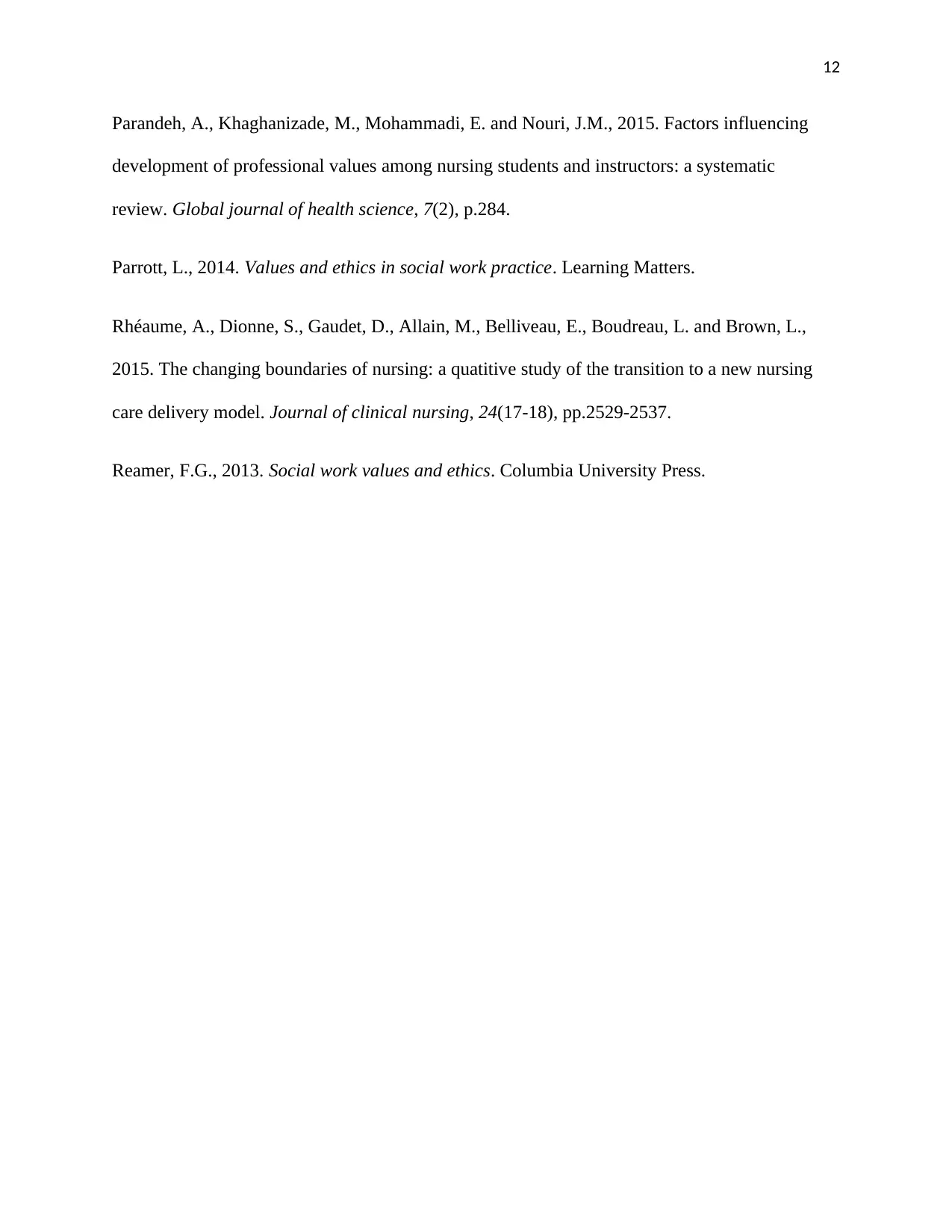
12
Parandeh, A., Khaghanizade, M., Mohammadi, E. and Nouri, J.M., 2015. Factors influencing
development of professional values among nursing students and instructors: a systematic
review. Global journal of health science, 7(2), p.284.
Parrott, L., 2014. Values and ethics in social work practice. Learning Matters.
Rhéaume, A., Dionne, S., Gaudet, D., Allain, M., Belliveau, E., Boudreau, L. and Brown, L.,
2015. The changing boundaries of nursing: a quatitive study of the transition to a new nursing
care delivery model. Journal of clinical nursing, 24(17-18), pp.2529-2537.
Reamer, F.G., 2013. Social work values and ethics. Columbia University Press.
Parandeh, A., Khaghanizade, M., Mohammadi, E. and Nouri, J.M., 2015. Factors influencing
development of professional values among nursing students and instructors: a systematic
review. Global journal of health science, 7(2), p.284.
Parrott, L., 2014. Values and ethics in social work practice. Learning Matters.
Rhéaume, A., Dionne, S., Gaudet, D., Allain, M., Belliveau, E., Boudreau, L. and Brown, L.,
2015. The changing boundaries of nursing: a quatitive study of the transition to a new nursing
care delivery model. Journal of clinical nursing, 24(17-18), pp.2529-2537.
Reamer, F.G., 2013. Social work values and ethics. Columbia University Press.
⊘ This is a preview!⊘
Do you want full access?
Subscribe today to unlock all pages.

Trusted by 1+ million students worldwide
1 out of 12
Related Documents
Your All-in-One AI-Powered Toolkit for Academic Success.
+13062052269
info@desklib.com
Available 24*7 on WhatsApp / Email
![[object Object]](/_next/static/media/star-bottom.7253800d.svg)
Unlock your academic potential
Copyright © 2020–2025 A2Z Services. All Rights Reserved. Developed and managed by ZUCOL.





